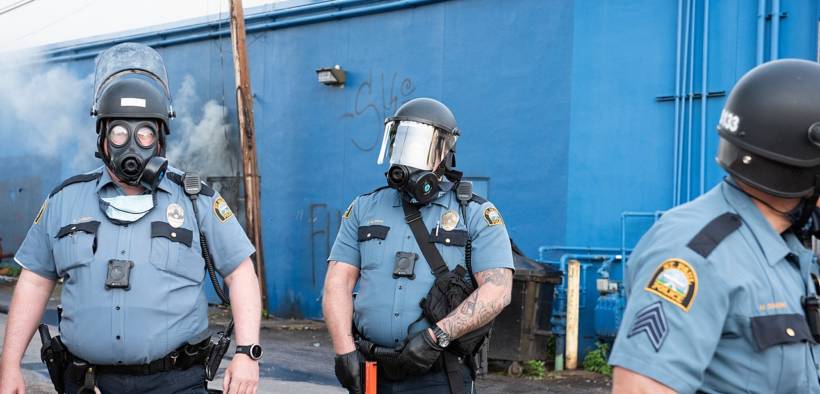Police Reform Legislation Underway in DC

The bill contains stricter rules for the use of lethal force and stronger legal accountability for law enforcement, but critics argue that the measures don’t go far enough.
Representatives and Senators are in the process of creating the Justice in Policing Act of 2020. The measure contains a wide array of reforms aimed at solving some of the problems that have plagued police forces across the country and led to the ongoing protests calling for equality, justice, and systemic change in American law enforcement.
The Justice in Policing Act of 2020
In the House the bill is being introduced by Rep. Karen Bass (D-CA) who is head of the Congressional Black Caucus, as of June 8 she was joined by 165 Democratic co-sponsors. On the Senate side there are some high profile supporters including Senator Kamala Harris (D-NY) and Senator Cory Booker (D-NJ). It includes sweeping reforms for law enforcement at several levels.
If passed the bill will withhold federal grant money from law enforcement agencies unless their jurisdiction has in effect a law to prohibit “chokeholds or carotid holds.” The term is defined to include “any pressure to the throat or windpipe.”
It contains anti-lynching legislation that makes lynching a Federal crime.
For Federal law enforcement officers, the bill bans “no-knock warrants” for drug offences. These warrants allow officers to enter a residence without identifying themselves as law enforcement. It also incentivizes state and local law enforcement agencies to ban no-knock warrants by withholding funds from places that don’t pass their own bans.
Federal law enforcement would have more strict rules about the use of deadly force and less lethal force.
It would increase personal legal accountability of law enforcement and corrections personal by limiting “qualified immunity,” the legal doctrine that shields officers from legal liability for certain actions taken while on duty.
It creates standard rules about the use of body cameras for law enforcement.
A section titled the “Stop Militarizing Law Enforcement Act” would make it harder for domestic law enforcement agencies to acquire excess equipment from the Department of Defense.
There are sections aimed at stopping racial and religious profiling and promoting the use of de-escalation techniques by law enforcement.
It also requires a Federal registry of police misconduct and makes other changes.
Will it work?
Many of the specific reforms proposed in the bill have worked when implemented on the state and local scale. As a national strategy implementing these changes can be more challenging. Because law enforcement branches are not Federally controlled, implementing national standards is challenging and may take a lot of time. For instance, the bill incentivizes the passage of state and local bans on chokeholds or carotid holds, but Congress can’t require states and municipalities to end these practices. State and local lawmakers will have to draft and pass their own legislation. Because many State legislatures have already recessed for 2020, the earliest some will be able to pass laws will be in the 2021 legislative year, so actual reform won’t be coming to many law enforcement agencies until mid-2021 or later in many places.
The structure of these sections of the bill is due to the fact that the Federal government, intentionally, has limited control over local law enforcement. But the extended time frame for this type federal influence may meet resistance from those who see defunding police departments entirely as the best option left right now. The killing of George Floyd by a police officer using a type of carotid restraint on May 25, and the killing of Breonna Taylor on May 30 by officers executing a no-knock warrant have given a renewed sense of urgency to these problems that have existed unchecked for decades. The anti-lynching section of the bill is named for Emmett Till who was killed in 1955. The section trying to end chokeholds is named for Eric Garner, who was killed by police in 2014, but it could have been named after Lloyd D. “Tony” Stevenson, a black Marine Corps veteran who was also killed by an police officer using a chokehold, in April, of 1986.
The process of Federally incentivized local change also leaves room for inaction on the local level. There is the chance that some State’s or municipalities may opt to go without Federal funds for their law enforcement agencies and allow them continue to use deadly tactics like chokeholds and no-knock warrants.
Can it Pass?
The measure will have no issue making it past the Democratic controlled House, but its fate in the Senate is unclear. So far there has not been public Republican support for it, but that could change. Senator Mitt Romney (R-UT) recently marched with Black Lives Matter protestor in DC and could be a potential bi-partisan backer in the Senate. President Trump currently seems to be taking an anti-protest, anti-reform stance, but a growing list of Republicans are denouncing the President and may be open to working with Democrats on needed reforms.
If it passes the Justice in Policing Act will create some important change in the American law enforcement system. But whether or not it passes, a great deal of work will still be needed at the State and local level to truly reform law enforcement and make it just and equal for all Americans.















